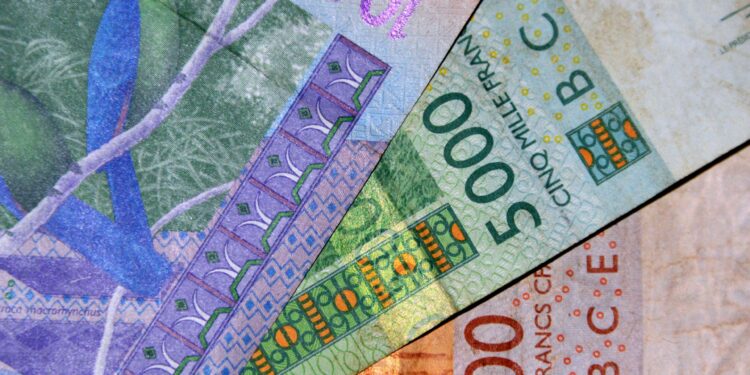Al -Jazeera Net Correspondents
Imagine that a country stipulates that your country should deposit half of its foreign exchange reserves, in exchange for allowing it to issue its own currency. I also imagine that this country will control the value of your currency and have the veto (veto) of its exchange rates.
It may seem closer to the financial occupation, but it is a reality in 14 African countries, which deposits half of its reserves in France – the former colonial power – which still imposes its dominance through a currency called “African Francia”.
The birth of the African franc
The African franc was established in December 1945, with a decree from General de Gaulle, after France’s approval of the Bretton Woods Agreement. According to the Brookings Foundation, the franc has become the official currency of France colonies in Africa.
Today, African francs are used in 14 sub -Saharan African countries as part of what is known as the “African Francia region”, and it is divided into two regions each of them is a central bank:
- West Africa regionIt includes both boys, Burkina Faso, Cote d’Ivoire, Guinea Bissau, Mali, Niger, Senegal and Togo. The West Africa Economic and Country (WAEMU) is formed, and its central bank is the central bank of West African countries. It is symbolized by its currency as “XOF”.
- Central Africa regionIt includes Cameroon, Central Africa, Congo, Gabon, Equatorial Guinea and Chad. The “Central African Economic and Central Group” (CEMAC), and its central bank is the Bank of Central Africa. It symbolizes her currency as “XAF”.
The value and the connection to the currencies
The French treasury included a fixed exchange rate for the African franc, and it is obligated to deposit 50% of its foreign exchange reserves, according to a report broadcast by the CNBC channel.
Since its inception, the French francs have been tied by 1:50, until France reduced its value in 1994 by 50%, to 1: 100, which caused widespread economic crises, according to Bockenses.
After France joined the eurozone, the franc was fell in the latter at a fixed exchange rate of 1 euro = 655.96 Franca Africa, according to the Bank of France. Although both currencies are theoretically separate, they are equal in value.
A strict system and restricted conditions
Foreign exchange accounts are managed by open accounts of the French Treasury, and the rules include:
- Currency printing takes place in France.
- Central banks should deposit 50% of foreign assets at the French Treasury.
- Maintaining a “foreign cash cover” at least 20%.
- France reserves the right of veto against the adjustment of exchange rates.
New colonialism
In a study published on the “Reservation Gate” platform, researchers, Philip Lusu and Terifur Hopper, confirms that political independence does not end colonialism, unless countries adopt an independent economic and political base.
This case is called “new colonialism”, as the previous colonial powers continue to control the institutions of independent countries.
The African franc countries constitute about 14% of the continent’s population, covering an area of 965 thousand square miles, and contributes 12% of the GDP of Africa, according to the International Monetary Fund.
According to Harvard International Magazine, these countries maintain only 30% of their reserves, after depositing 50% in France and 20% for the financial cover, which negatively affects the growth of individual income and poverty rates.
France: partnership or influence?
Official France is rarely attached to this system directly, but it sees a mechanism to ensure economic and critical stability in countries suffering from economic fragility. Paris also says that the franc countries benefit from a stable exchange rate and low enlargement compared to their neighbors.
However, the regime’s critics see in this argument a simplification that ignores the impact of monetary restrictions on development, and depriving countries of basic sovereign tools such as defining interest or managing inflation according to local priorities.
The most prominent negative economic impacts
According to a study of the African Development Bank, the most prominent negative effects as a result of the application of these policies include:
- Critical sovereignty: because countries are unable to draw critical policies suitable for their circumstances.
- Exposure to external economic shocks: as a result of connecting the franc to the euro.
- Resource depletion: as a result of obliging deposit in France.
- Poor manufacturing: due to relying on the import of final commodities, which hinders development.
Future prospects
France continues to control the policy of cash francs, with the aim of maintaining subordinate economies that complement its economy, as sources of raw materials and a market for European products, according to the platform “Tax Network”.
However, some countries began to rebel against this system, and Burkina Faso, Mali and Niger announced their intention to abandon the franc, after withdrawing from “Ecasas”. “What keeps us in a state of slavery … we will break these restrictions,” said Burkini President Ibrahim Traore.
Niger President Omar Abdel Rahman Tianyan also stated that giving up the franc “a sign of sovereignty”, despite the difficulty of moving that requires establishing a new central bank and setting an independent monetary policy after decades of dependency.



